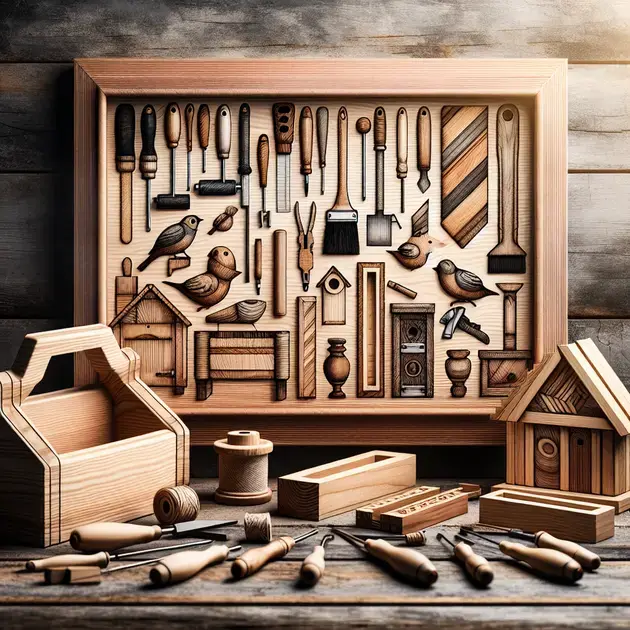Wood project ideas for beginners can be limitless and exciting for those looking to start their woodworking journey. Whether you’re interested in building small decor pieces or functional furniture, there are plenty of simple and straightforward projects to choose from. With the rise of online tutorials and DIY resources, getting started with woodworking has never been easier.
One important aspect to consider when embarking on a woodworking project is to ensure you have the right tools and equipment. Investing in quality tools can make a significant difference in the outcome of your projects and can help you build with precision and accuracy. By starting with smaller projects and gradually working your way up to more complex ones, beginners can develop their skills and confidence in working with wood.

Woodworking Basics for Beginners
Woodworking can be a rewarding hobby or a profitable business venture, but for beginners, it’s important to start with the basics. One of the first things you’ll need to do is familiarize yourself with different types of wood and their uses. Softwoods like pine are great for beginners due to their affordability and ease of workability. Hardwoods like oak and maple are more durable and suitable for furniture making.
Next, you’ll need to invest in some essential tools for woodworking. A good place to start is by purchasing a basic set of tools including a hammer, chisel, handsaw, and measuring tape. These tools will help you get started on your woodworking projects and develop your skills. Websites like Wood Magazine offer beginner-friendly guides on woodworking tools and techniques.
As a beginner, it’s essential to start with simple woodworking projects to build your skills and confidence. A popular project for beginners is building a small bookshelf or a wooden picture frame. You can find step-by-step guides and project ideas on woodworking communities like Instructables. These platforms offer tutorials and inspiration for woodworkers of all skill levels.
Practice makes perfect in woodworking, so don’t be afraid to make mistakes and learn from them. As you gain more experience, you can start experimenting with different techniques and designs. Joining a local woodworking club or taking a woodworking class can also help you learn from experienced woodworkers and expand your knowledge.
Remember, woodworking is a skill that takes time to master, so be patient and enjoy the process. With dedication and practice, you’ll soon be able to tackle more complex woodworking projects and create beautiful handmade pieces.
Essential Tools for Wood Projects
Having the right tools is essential for any woodworking project, whether you’re a beginner or an experienced woodworker. Some essential tools to have in your workshop include a table saw, a router, a power drill, and a set of clamps. These tools will help you cut, shape, and assemble wood with precision and efficiency.
Investing in high-quality tools is crucial for achieving professional results in your woodworking projects. Websites like Rockler offer a wide range of woodworking tools and accessories for every skill level. Researching different tool brands and reading reviews from other woodworkers can help you choose the best tools for your projects.
For woodworkers on a budget, there are also affordable tool options available. Second-hand tools can be found at garage sales, online marketplaces, and woodworking forums. Before purchasing used tools, make sure to inspect them for any defects or damage to ensure they are safe to use.
Proper maintenance of your woodworking tools is crucial for their longevity and performance. Regularly clean and sharpen tools like chisels and saw blades to ensure they work effectively. Websites like Woodcraft offer tips and tutorials on tool maintenance and care.
Building a collection of essential tools for wood projects takes time, so start with the basics and gradually add more specialized tools to your workshop as you advance in your woodworking skills.
Progressing from Simple to Complex Woodworking
Once you’ve mastered the basics of woodworking and have acquired the necessary tools, you can start progressing from simple to complex projects. One way to challenge yourself is by working on projects that incorporate new techniques or materials.
Try building furniture pieces like a coffee table or a chest of drawers that require precise measurements and joinery skills. Websites like Popular Woodworking offer plans and tutorials for intermediate and advanced woodworking projects.
Experimenting with different wood species and finishes can also enhance your woodworking skills. Hardwoods like cherry and walnut offer beautiful grain patterns and colors, perfect for creating high-end furniture pieces. Websites like Fine Woodworking provide resources on wood selection and finishing techniques.
As you tackle more complex woodworking projects, don’t be afraid to push your creative boundaries and personalize your designs. Customizing projects with inlays, carvings, or unique details can showcase your craftsmanship and creativity. Online woodworking communities like WoodNet Forums offer inspiration and advice from experienced woodworkers.
Remember that woodworking is a lifelong learning process, so continue to challenge yourself and explore new techniques to improve your skills. With dedication and practice, you’ll be able to create stunning woodworking projects that showcase your passion for craftsmanship.

**
Budget-Friendly Woodworking Projects
**
When it comes to woodworking, not every project needs to break the bank. There are several budget-friendly woodworking projects that you can take on to hone your skills without draining your wallet. To get started, consider making simple yet practical items such as a wooden key holder, a small bookshelf, or even a picture frame. These projects require minimal materials and can be completed with basic tools, making them perfect for woodworkers on a budget.
Step-by-step guide:
1. Choose a project idea that aligns with your skill level and budget constraints.
2. Gather the necessary materials and tools, making sure to prioritize affordability without compromising quality.
3. Follow detailed online tutorials or purchase woodworking plans to guide you through the project.
4. Take your time and pay attention to details to ensure a professional-looking result.
5. Don’t be afraid to get creative and personalize your project to make it truly unique.
By focusing on budget-friendly woodworking projects, you can continue to refine your skills and unleash your creativity without breaking the bank. With a little resourcefulness and a lot of passion, you can tackle various projects while staying mindful of your expenses.
**
Effective Tips for Improving Woodworking Skills
**
Improving woodworking skills requires dedication, practice, and a willingness to learn and grow. Whether you’re a beginner or a seasoned woodworker, there are always ways to enhance your craft and take your skills to the next level. One effective tip for improving woodworking skills is to seek out mentorship or join a woodworking community where you can learn from others, ask questions, and receive constructive feedback on your projects.
Step-by-step guide:
1. Set specific goals for what you want to achieve with your woodworking skills, whether it’s mastering a new technique or completing a challenging project.
2. Invest in quality tools and materials to ensure precision and durability in your woodworking projects.
3. Practice regularly and experiment with different techniques to broaden your skill set and knowledge base.
4. Attend workshops, classes, or online tutorials to expand your woodworking expertise and learn from experienced professionals.
5. Embrace mistakes as learning opportunities and don’t be afraid to step out of your comfort zone to try new things.
By implementing these effective tips for improving woodworking skills, you can elevate your craftsmanship, tackle more complex projects, and ultimately become a more skilled and confident woodworker.
**
Exploring Creative Woodworking Techniques
**
Woodworking is not just about following instructions; it’s also about exploring creative techniques to elevate your projects and showcase your unique style. To enhance your woodworking skills, consider experimenting with unconventional materials, incorporating intricate detailing, or adding personal touches such as custom engravings or finishes. By thinking outside the box and pushing the boundaries of traditional woodworking, you can create one-of-a-kind pieces that truly stand out.
Step-by-step guide:
1. Research innovative woodworking techniques and trends to stay inspired and expand your repertoire of skills.
2. Experiment with different types of wood, stains, and finishes to create contrasting textures and visual effects in your projects.
3. Incorporate elements of design, such as symmetry, balance, and proportion, to enhance the aesthetic appeal of your woodworking creations.
4. Collaborate with other artisans or designers to gain new perspectives and insights on creative woodworking practices.
5. Continuously challenge yourself to think creatively and push the boundaries of what is possible in woodworking.
Exploring creative woodworking techniques not only allows you to express your individuality but also helps you grow as a woodworker by pushing your skills to new heights. Embrace the opportunity to innovate and push yourself creatively in your woodworking endeavors.
**
Conclusion
**
Woodworking offers a realm of possibilities where creativity and craftsmanship converge. By embarking on budget-friendly projects, woodworkers can sharpen their skills without financial strain. From crafting a simple key holder to a personalized picture frame, these projects not only refine abilities but also inspire innovation.
Furthermore, improving woodworking skills transcends mere practice; it demands dedication and a quest for continual growth. Seeking mentorship and engaging with woodworking communities provide invaluable insights and feedback. Embracing mistakes as learning opportunities and venturing into uncharted territories are pivotal steps towards honing one’s craft.
Delving into creative woodworking techniques unveils a world of limitless exploration. Experimenting with unconventional materials, intricate detailing, and collaborative endeavors not only showcases individuality but also propels woodworking skills to new dimensions. By pushing artistic boundaries and embracing innovation, woodworkers can create masterpieces that stand out in a sea of traditional craftsmanship.